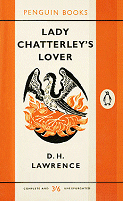Sixties
City presents
a wide-ranging series of
articles on all aspects of the Sixties, penned by the creator of the iconic
60s music paper Mersey
Beat
|
Sixties
City presents
a wide-ranging series of
articles on all aspects of the Sixties, penned by the creator of the iconic
60s music paper Mersey
Beat
|
||||||
|
 |
On 20th
October 1960 Penguin Books were taken to court under the Obscene Publications
Act as publishers of D. H. Lawrence’s novel ‘Lady Chatterley’s Lover.’ In
August, Penguin had announced their intention of publishing the book in
full. Previously, only expurgated versions of the novel had been available. It was Lawrence’s last novel, written in 1927-28 and had been banned on publication. There were thirteen incidents of sexual intercourse in the book, which told of the torrid and passionate love affair between Lady Connie, wife of Sir Clifford Chatterley, and a randy gamekeeper called Mellors. It is a complicated affair because Sir Clifford has been paralysed from the waist down and suggests to his wife that she conduct an affair to enable her to bear him an heir. The trial opened at the Old Bailey and Q.C. Mervyn Griffith-Jones, for the Prosecution, didn’t exactly endear himself to the general public when he asked the jury: “Is it a book that you would wish your wife or your servants to read?” He also told them: “The word ‘fuck’ or ‘fucking’ occurs no less than thirty times.” He contended that the book would tend to corrupt by creating, “thoughts of a most impure and lustful character” and added, “It sets upon a pedestal adulterous and promiscuous intercourse. It commands, and indeed it sets out to command, sensuality as a virtue.” The jury read the book and a number of witnesses were called for the Defence, including Dr. John Robinson, the Bishop of Woolwich, Dame Rebecca West and E. M. Forster, the novelist. The Establishment, it seemed, were concerned that it would go on sale to the general public. In his summing-up, the judge commented, “You know, once a book goes into circulation it does not spend its time in the rarefied atmosphere of some academic institution…it finds its way into the bookshops and on to bookstalls, at 3s 6d a time, into public libraries, where it is available for all and sundry.” On 2nd November, after six days of trial and a three-hour discussion to consider the case, the jury returned a verdict of “Not Guilty.” The book sold out of its first print run of 200,000 copies priced at 3s. 6d (17.5p) on the first day of publication and Sir Allen Lane of Penguin Books announced, “I have set things in motion for a second print of either 200,000 or 300,000.” |
|
Article
|